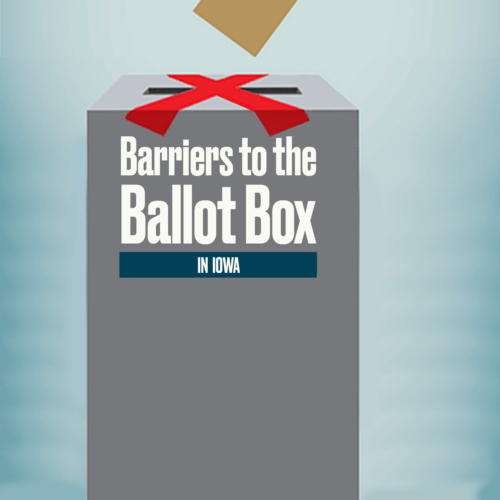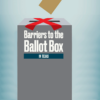Introduction
Iowa eliminated a hurdle to voting in this pandemic year by opting to send all active voters applications for absentee ballots. But hurdles at different parts of the process could trip up voters.
Here’s a look at some of the most significant updates on restrictions to voting rights and access in the state:
Voter ID
This will be the first presidential election in which Iowans must comply with the state’s contested 2017 voter-identification law, upheld in part in 2019 after a court battle. To get an absentee ballot, voters must have either a driver’s license, a state identification card known as a non-operator’s ID or a voter ID. Voters heading to the polls have additional options, but the requirement adds a step that could disenfranchise more vulnerable residents, including people of color, the elderly and residents with disabilities, warned Veronica Lorson Fowler, communications director for the American Civil Liberties Union of Iowa.
Sign up for The Moment newsletter
Our CEO Susan Smith Richardson guides you through conversations and context on race and inequality.
Iowa legislators said the requirement would prevent voter fraud. But “especially in our state, there’s almost no documented cases at all,” Fowler said.
“What we’re doing is making it more complicated, more moving parts, more pieces of paper, more repeat trips for people, for apparently no gain — other than making it more difficult for people to vote,” she said.
Kevin Hall, a spokesman for the Iowa secretary of state, said all registered voters who do not have a driver’s license or non-operator’s ID receive a voter ID. “If they lose the card, can’t find it, etc., they can call their county auditor to get the replacement card or get the PIN number,” he wrote in an email.
Invariably, though, some voters get confused. Even in elections when most people aren’t voting absentee for the first time, county election officials get some applications without the driver’s license or ID number filled in as required.
Mail-in ballots
Iowa’s secretary of state decided to automatically mail active registered voters an application for an absentee ballot this year, which won praise from voting-access advocates. But Republicans in the state Senate tried to stop Republican Secretary of State Paul D. Pate from following through. The House opted instead to require prior approval from a bipartisan council of legislators, which Pate ultimately received.
Another recent move by the legislature blocked local election officials from filling in missing driver’s license or voter ID numbers on ballot applications when voters forget to do it. Instead, they must contact the voters to get the information they already have in their files. The League of United Latin American Citizens and another group sued, saying this extra step will ensure that some residents won’t get their ballots in time or at all. A judge ruled against them in late September.
“It puts all the burden now on the voter,” said Luis Roberto Vera, the league’s national general counsel.
Election officials in several counties mailed the ballot applications with voters’ ID numbers already filled in, intending to make the task easier. The Trump campaign and other Republican groups sued, arguing that jeopardized election security. In August and September, judges ruled in Republicans’ favor, invalidating tens of thousands of completed applications because they didn’t follow Pate’s directive to send the forms out blank.
The Iowa Democratic Party and other groups filed a lawsuit against Pate in August over that order.
Re-enfranchisement
Thousands of Iowans gained back their voting rights in time for the general election this year. Republican Gov. Kim Reynolds issued an executive order allowing people with felony convictions other than for homicides to vote, once they’ve completed the terms of their parole and probation.
Iowa was the last state in the country to stop permanently banning all residents with felonies from voting — a policy that traces its history to Southern states aiming to disenfranchise Black residents after the Civil War while also aggressively targeting them for arrest. Nearly 10 percent of Black residents in Iowa could not vote in 2016 because of the state’s rule, according to a report by the Sentencing Project, an advocacy group.
“This action will benefit people regardless of race or ethnicity, but with the grave racial disparities in our criminal justice system, it will very significantly benefit African Americans and other people of color,” Betty C. Andrews, president of the Iowa-Nebraska NAACP, said in a statement when the voting ban was lifted.
Fowler said she was also glad to see the change, but the ACLU’s position is that no one should lose their voting rights because of a criminal conviction. Two states, Maine and Vermont, don’t strip them at any point in the criminal-justice process.
Read more in Money and Democracy
US Polling Places
In Maryland, a switch over mail-in ballots worries advocates
Election officials aimed to send mail-in ballots to all registered voters in the 2020 primary. For the general election, they’re sending applications instead.
US Polling Places
In Florida, voting rights restored, then snatched back
The big question is who gets to vote this year. But disasters, and not just COVID-19, add more wrenches in the works.



Join the conversation
Show Comments